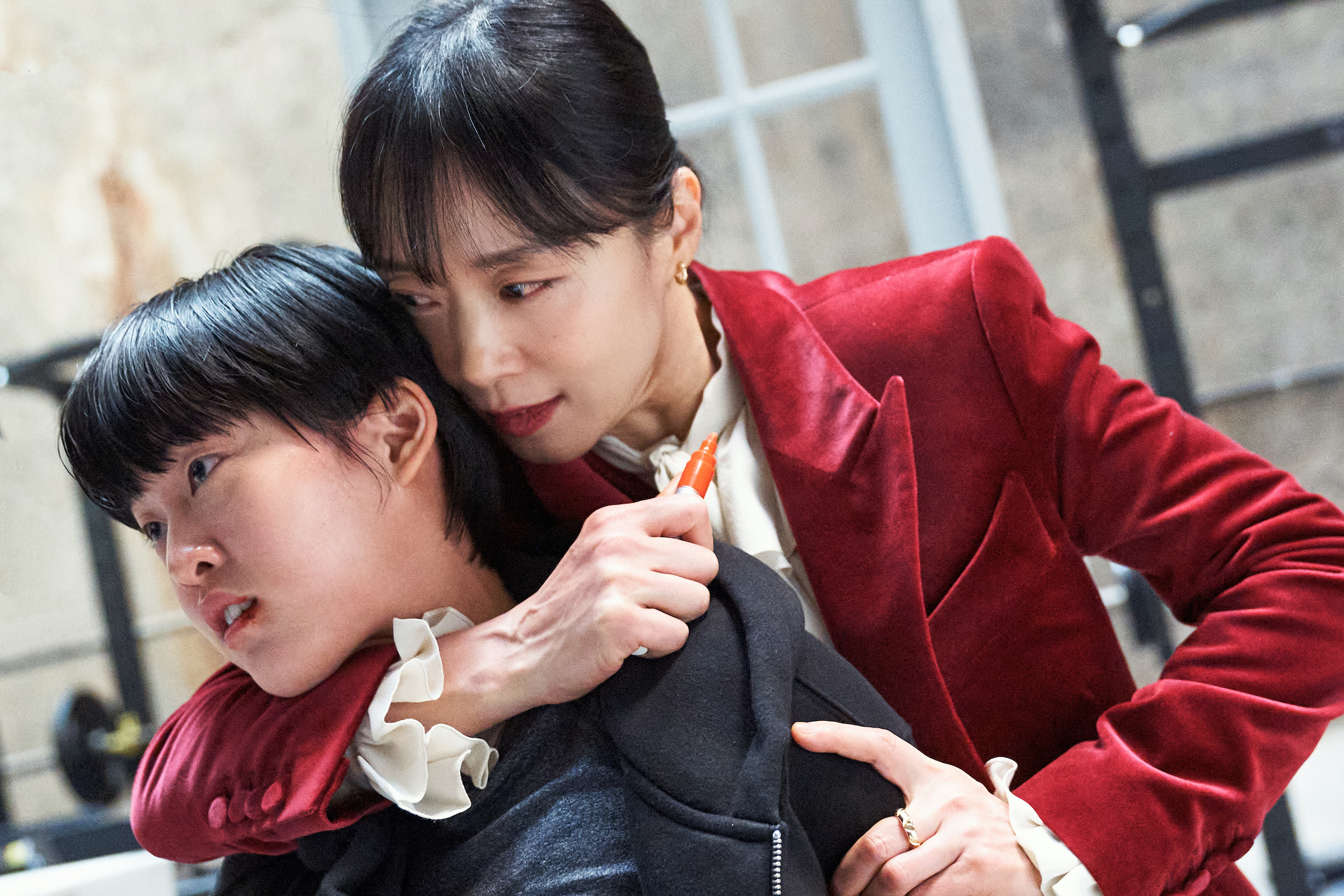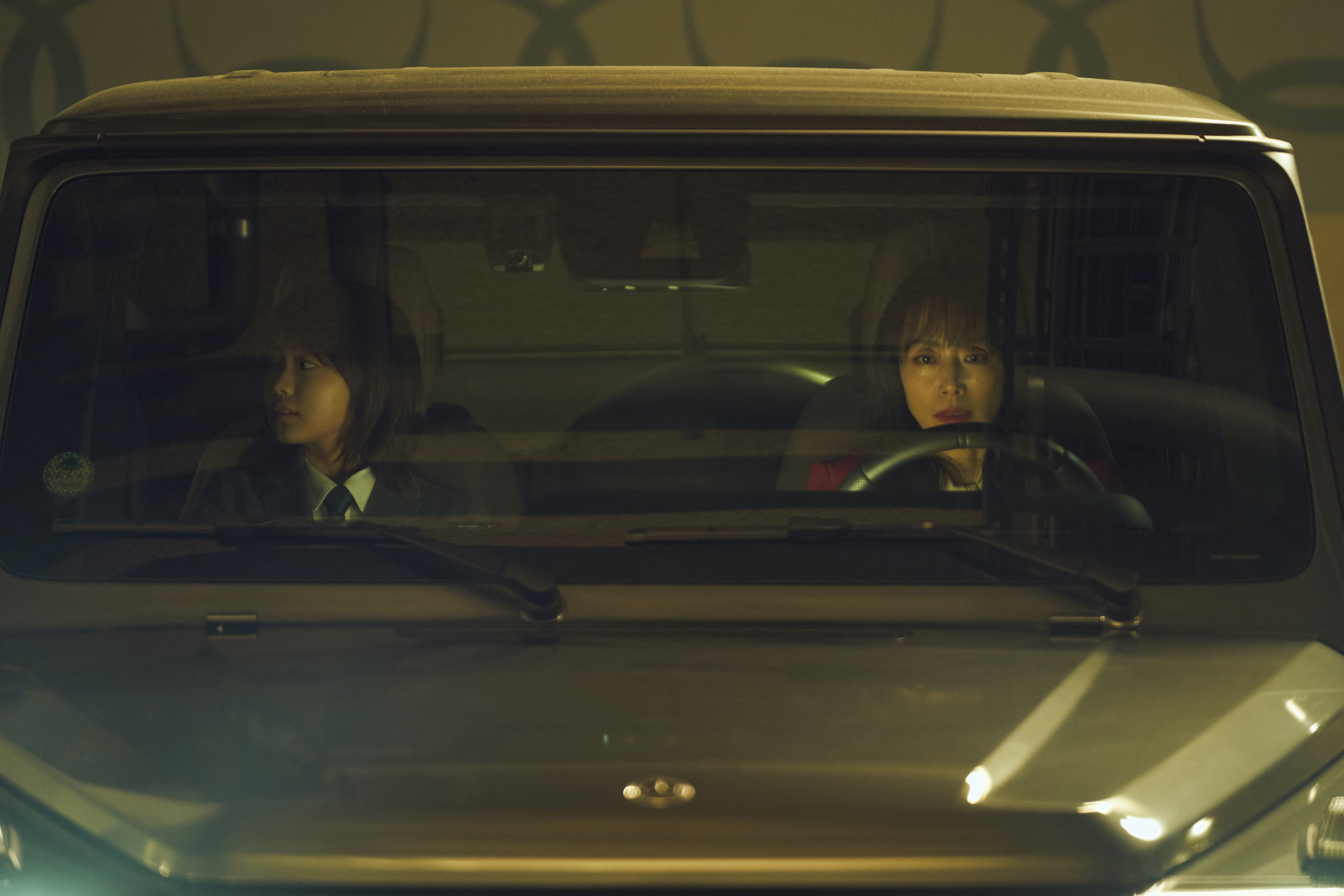
Over steaming hot plates of tteokbokki (simmered rice cakes), Gil Boksoon (Jeon Do-yeon) vents to her boss about her daughter.
“She used to follow me around when I came home, and she’d tell me about school, even what they had for lunch that day,” Boksoon says. “Now she’s always in her room with the door closed. She has all these secrets.”
It sounds like a fairly typical conversation between two adults—a parent airing frustration over the challenges of raising a teen—until it soon becomes clear that things are far from normal.
“Everything that you taught me when I started training: find your opponent’s weakness, their next move, and catch them off guard,” Boksoon tells her boss, “none of that works on her.”
Then, deadpan, she delivers the movie’s logline: “Killing other people is easier than raising a kid.”
Gil Boksoon—known to her colleagues as Kill Boksoon due to her skill—is an assassin with a 100% success rate. Her boss, Cha Min-kyu (Sol Kyung-gu), heads the killing agency MK Ent. in Seoul. And her 15-year-old daughter, Jae-yeong (Kim Si-a), has no idea—she sees her mom as an uncool event planner.
This tightrope walk between assassin and mother is the central premise of Kill Boksoon, a splashy, stylish South Korean crime action film that premiered at the Berlin International Film Festival to critical acclaim in February and comes to Netflix on Friday.

Writer and director Byun Sung-hyun says he dreamt of working with star Jeon Do-yeon for years. The movie’s script offers Jeon a fresh avenue after a string of high-profile romantic films and dramas—like her breakout role in 1997’s The Contact, her international breakthrough in 2007’s Secret Sunshine, and 2015’s The Shameless, which brought her back to the Cannes Film Festival for the fourth time. Speaking with TIME in Korean, with translation by interpreter Haley Hyunyoung Jung, Byun says he wanted to give Jeon an action movie.
“That’s going to give me a better chance of leaving my name as part of one of her representative works in her line of filmography,” he says.
After deciding on the action genre together, the director and actor shifted into crafting the plot, also built around Jeon. Byun immersed himself in Jeon’s life, observing her as a fly on the wall. He found himself especially intrigued by the discrepancy between her career as one of Korea’s top actors and her day-to-day role as a mother to a teenage daughter.
“At times, I could see her struggle as a mother,” Byun says. “And her struggling came as very endearing to me. They felt very lovable.”
Read More: It’s Time to Say a Loving Goodbye to John Wick
Jeon is, in Byun’s words, “the actor of actors.” Boksoon, in the movie, is the killer of killers, an idol to whom her peers look up. The director simply subbed one iconic, demanding profession for another. The commonalities slip into the movie’s terminology: an assassination is called a “show,” the location where it happens is a “set,” “cameras are rolling” once the job starts, trainees are called “interns,” and interns “debut” with their first kill. But the trials and tribulations of motherhood stayed the same.
“When she was speaking with her daughter, or when she would quarrel with her daughter, I would see her, at times, be at a loss for words,” Byun says. “She would just be dumbfounded. I was very intrigued by that.”
After a successful mission, Boksoon returns to MK, walking in on a class of trainees re-creating one of her iconic fights (this one set in a Yeosu urinal). Promising young intern Kim Young-ji (Lee Yeon) is at the top of her class in a field dominated by men, evoking a young Boksoon. (“Girls are really excelling these days,” Boksoon quips after watching her train.) Young-ji is young, serving as a foil for Boksoon’s own daughter, who is kept far away from her mother’s job.
Two turning points of the film, dramatic and emotional, land like a one-two punch: First, Boksoon intentionally throws a job she was working with Young-ji—going against strict company policy—after learning of the parent-child relationship between the client and the target. Young-ji takes the fall and gets fired on the cusp of her debut, an unintended consequence. As Boksoon’s professional world is reeling, her daughter is forced to come out to her due to unforeseen and uncontrollable circumstances. Life is tugging Boksoon to the extreme ends of two deeply difficult jobs.

Later, when Boksoon and Young-ji try to pick up the pieces over noodles, the dynamic of their mentor-mentee relationship shifts.
“Look, sometimes in this life, things become your fault for no reason, and other times, you get away with things you did,” Boksoon says. “For example, let’s say that you like girls. You’re not doing anything wrong. But to others, it could seem like you are.”
“Isn’t that a little conservative for a hired assassin?” Young-ji replies. “It’s up to us to know if we’ve done wrong. Nobody else can decide that.”
“You kids these days,” Boksoon sighs, “are so wise.”
Speaking with TIME from South Korea, Jeon points out the difficulty of being objective. “At times with my daughter, a single thing that she says can give me a big lesson, in that it makes me realize if that is right or wrong,” Jeon says in Korean, also translated by Haley Hyunyoung Jung. “And at times, because of that, I would be at a loss for words.”
“This is my first time being a mother,” Jeon continues. “And while I may have plans in terms of what kind of mother I want to be, because I am not as skilled, it’s difficult at times. So I feel like, being a mother to my daughter, I grow along with her.”
Irony pervades Kill Boksoon. The main character is a walking paradox, simultaneously taking life, while attempting to shape a life she brought into the world. Byun personified this dichotomy by focusing on the right side of Jeon’s face when Boksoon acted as a mother and the left side when she killed.
Read More: Here’s What’s New on Netflix in April 2023
“Whenever I see myself in a victim’s eyes as they die, I’m afraid to come home and then have her look at me,” Boksoon confides to her colleague, Han Hee-sung (Koo Kyo-hwan), as they clean up a job. “I’m selfish, ‘cause I won’t quit. I don’t want to give this up for her. Am I unqualified to be a mother?”
Even though this is a mother-daughter story, the director didn’t want the characters to sacrifice themselves for each other. He wanted them to find themselves, together.
“I’ve come to the conclusion that you have to lead a life where you are unashamed of yourself,” Byun says. “I don’t think, honestly speaking, Boksoon is, socially speaking, a good person. But I at least feel that, to herself, she is leading a life that she is unashamed of.”
More Must-Reads from TIME
- Cybersecurity Experts Are Sounding the Alarm on DOGE
- Meet the 2025 Women of the Year
- The Harsh Truth About Disability Inclusion
- Why Do More Young Adults Have Cancer?
- Colman Domingo Leads With Radical Love
- How to Get Better at Doing Things Alone
- Michelle Zauner Stares Down the Darkness
Contact us at letters@time.com